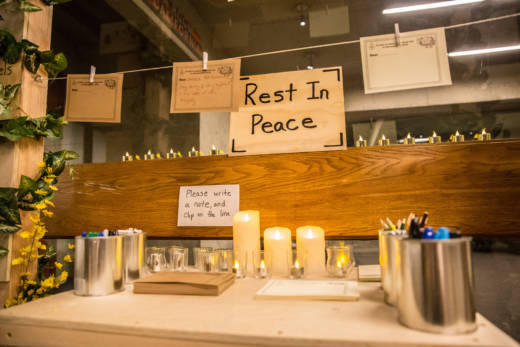“There’s people still mourning, hella people and hella families,” said DJ and event promoter Guerrilla Davis, who was blocked by the Ghostship Events account.
He pointed out that the name of the event was offensive not only to victims and survivors, but to the people who lost their housing and art spaces in the aftermath of the fire. In response to the tragedy, the city began cracking down on unpermitted live-work warehouses occupied by artists, often because they lacked other affordable places to live and create. As a result, Oakland lost many of the underground venues that nurtured experimental art and music.
“A lot of people got displaced,” Davis said. “The first art show I had in the Bay got shut down because of the warehouse enforcement.”
As more people began to sound off on Instagram, the Ghostship Events account posted a statement at around 4pm Wednesday saying that it was too late to change the name. “We want to take a moment to honor the lost friends and family with a moment of silence, announcement, and memorial wall on the ship. With 16 days left before the event, the community wants us to change the name instead of making these people known to a group of people that has no idea of the fire,” the account wrote.
Survivors and friends of the victims grew more incensed. “I feel like that’s bullshit,” says Grompi Green, a DJ and event producer who knew several of the victims. “I don’t think it takes that much effort to change a name.”
About two hours later, the statement was deleted, and the Ghostship Events account became Hallowship Events. Still, the old promotional materials and ticket website with the Ghostship name remain up, and no apology or further acknowledgement has been posted publicly. In an email to KQED, the promoter said new flyers were forthcoming.
“We, like many bay area natives, were un aware of this tragic event,” DiscoLab Events wrote to KQED via email. The owner of the account refused to disclose their identity. “The event was announced in July this year and we received positive feedback up until a couple days ago. … We do need a couple days to create new content and hope the community can be patient.”
DiscoLabs Events’ claims of ignorance surprised most of the people interviewed for this story. The warehouse fire made international headlines, and received local and national news coverage up until earlier this year, as the trial of master tenant Derick Almena concluded in March. A Google search of the words “ghost ship” yields results about the fire on the first page.
This is also not the first controversy concerning use of the name. In 2017, a popular, different Halloween party changed its name out of respect for the victims. And in 2019, authors Ayelet Waldman and Michael Chabon scrapped plans for a CBS TV drama series about the tragedy after people accused them of using the story for personal gain.
“We googled ghostship cruise and the movie popped up. Nothing of the fire came up. Just the movie and other cruise companies,” the DiscoLab party promoter told KQED.
Survivors KQED spoke with said they appreciate the name change and are still waiting for a real apology. “Last time I saw it, it seemed like they were giving lots of excuses,” says Dean Bonilla, who was placed on a missing persons list in 2016 because they were headed to the party when the fire erupted. “They never actually gave an apology, and they weren’t actually accountable to what they did.”


